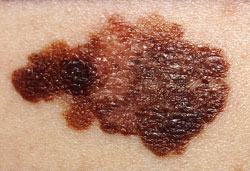Two new drugs for melanomas are being termed as the biggest breakthrough in the last five decades by cancer experts. These drugs are the first ones to be effective in advanced forms of the cancer.

(Image: Wikimedia Commons)
Doctors and experts meet in the Melanoma Research Conference in Sydney to be briefed on the new drugs. These drugs are said to work even on secondary tumours that come from the melanoma "seeds" that get planted in other major organs like brain, liver etc. This stage of the cancer is usually untreatable.
Rick Kefford, professor of medicine at Sydney's Westmead Hospital, who has been involved in the research, said two-thirds of patients with secondary melanoma who took either of the drugs, available in tablet form, developed "very significant tumour regression" even in the brain. He added, "We have never seen that type of activity with any other type of anti-melanoma treatment... It's extremely exciting and without question a major step towards prolonging the lives of people with this terrible disease."
Beating BRAF
These drugs act by attacking a mutated protein called BRAF, specific to melanoma cells, causing them to die while sparing normal cells. The drugs have been developed by Roche and GlaxoSmithKline and could become available as early as 2012 if further trials confirmed the good results, Professor Kefford said. David Speakman, chairman of the melanoma group of the Clinical Oncological Society of Australia hailed these drugs as "the brightest star on the (melanoma treatment) horizon in the past 50 years." Australia leads the world in melanoma incidence and it is the most common of all cancers in the 15-39 age group.
However Professor Kefford also added that while trials have oncologists confident the treatment of a melanoma will now be "considerably advanced", it was not a cure. "It is a very important breakthrough but it is not a cure; the patients nearly always relapse at some point, but it is a huge building block as we had nothing [and] now we have this...Most oncologists believe the drugs will be approved by the FDA [Federal Drug Administration] by the end of next year and will be on the market early the following year," he said. He added that Professor Ian Olver is the CEO of the Cancer Council and he says it is possible that the treatment could be applied to other cancers as well.
Treatment may be expensive
He also said that treatment with these drugs might be expensive. "We don't know what they will cost yet but if we take targeted drugs for other cancers they will probably be very expensive...If you look at Herceptin in [the treatment of] of breast cancer, it costs around A$80 000 (about R560 000) for a year's treatment but you have to weigh that up, if you like, against a productive year of a young person's life, and what is that worth in dollars? A lot of these drugs take over a A$1 billion (about R6.9 billion) to produce ... so it is really a costly process," he said.
Professor Kefford also spoke of the minimal side effects of the drug. "About one-third [of patients] get skin rashes, some get aches and pains in the joints, some peculiar things happen like their hair getting curly but they don't get the traditional side effects like ... horrible nausea and low blood counts because the drugs are very specific for the particular cancers," he said.




























